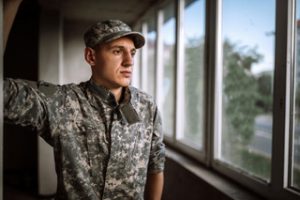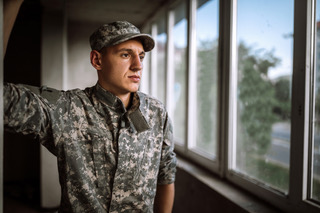It has been fifty years since I was with the Marine Corps infantry in Vietnam, and time and distance have allowed me to see and feel some things more clearly. Two things surprise me: one is that I now actually feel some pride for serving my country. And the second is my clear sense that something could change for me and many vets with your help, significantly, and the surprise is that I am willing to say to you, “Please help us come home.”
War is an ugly business, and those of us who come home can carry painful baggage. Some of what we bear is sorrow and guilt for surviving when others didn’t. We also live with memories that haunt us, the grief of our lost innocence, and sometimes, remorse for what we did. This normal fallout and weight of war creates distance between us and the world we come home to — often leaving us feeling separate from even our families and friends.
But I can now see that we vets are also left carrying something that adds to us feeling separate from you that should not be ours alone to carry. Something that, if you were willing to accept and carry your share of, could help bridge this divide and truly help us feel welcomed home.
What we vets carry is the burden of responsibility for what we did, as a representative of our country, in the brutal pursuit of these wars. Our government chose to invade Vietnam, Afghanistan and Iraq for reasons that have mostly long since lost any clear justification. So, many returning vets have no feeling of a heroic mission accomplished, no clear sense that we fought to restore or maintain our freedom, and no firm belief that the price paid in suffering and death by our soldiers and by the people in those countries was worth it. And we know the public turns away from this feeling that they mostly share and leave us alone holding it.
To serve our country, we left our homes and the world we knew. From the recruit’s first day in boot camp, the military is necessarily trying to tear away some of the threads that bind us to the fabric of our families and communities. Training young men and women to become effective soldiers means making them ready to kill people or support that killing. It means having them develop attitudes and readiness to take actions that are antithetical to a functioning civil society. It means training them to help minimize the trauma combat causes them. This training and then war can come at an unnecessarily high price when we are not welcomed home.
This is where you can help. When we come home, the whole community should take part in helping weave us back into the social fabric — and part of that is sharing the burden of responsibility. Merely thanking us for our service does not achieve that.
The smallest and most basic step you could take for us veterans, which would be a huge relief to so many suffering and aging former soldiers, would be to demand that your elected officials help veterans get the health care they were promised when they joined the service in order to protect you and enable our everyday freedom to continue.
If you did this, then you could say something like this to a veteran in a personal conversation: “Thank you for your service. And I want you to know I think the veterans who need help from the VA deserve much better care, and I make phone calls and write letters saying so to my elected officials. And I won’t stop.” That would stun most veterans, probably even leave them speechless, and certainly leave some teary-eyed.
The next couple of things you could do would be harder, but I believe they are every citizen’s responsibility. You would need to be willing to engage in some form of factual and moral reflection about our country and the cost of waging war. Then, at a dinner party or in the office lunchroom, you could say to a friend something like: “I’ve thought a lot about this war we have been fighting. I’ve followed the news and I know the price in life and limb to our service members has been huge, and I know we have paid billions of dollars to fund this war. And I have a sense of the cost to the people in that country. I feel very bad about the ugliness of war and for our lack of certainty about its cause, and while this is heavy on my heart, I will not turn away from it because I want to carry my share of the responsibility.”
Or maybe: “Look, I was opposed to this war and still feel that way. But I know that as an American I help fund the war and that I reap the benefits of the freedom that our military protects. I am trying to live as a fully responsible US citizen, and I won’t pretend I am innocent of responsibility. And I’m trying to carry my share of that.”
To take part in the brutality of war without having a clear idea of there being a justifiable cause comes at a great cost to many of us veterans. Most of us believed that we were going to war to serve our country and it is often hard to see how it did any of that. Democracy is a messy endeavor, but the more of us sharing the weight of being fully responsible citizens would mean less polarizing rhetoric and more coming together with a shared desire to make the right collective decisions for the greater good of our country.
We veterans want to come home, all the way home. We want to be part of this country and continue to help it find its way in this complex global reality we inhabit. So please don’t pat us on the back and then turn around and walk away. We need your help. We are waiting to be truly welcomed home, to be woven back into the fabric of community life and to join you in making this country as great as it can be. It’s what we signed up for.
